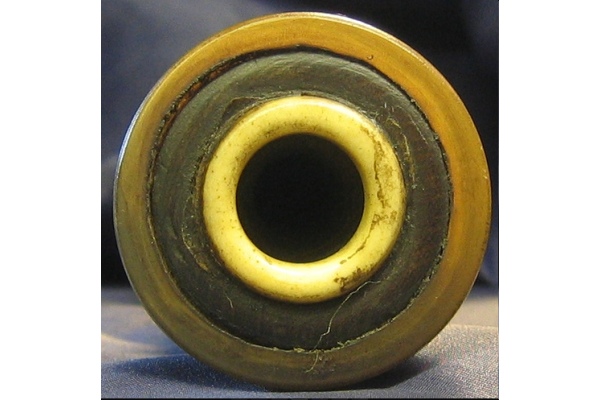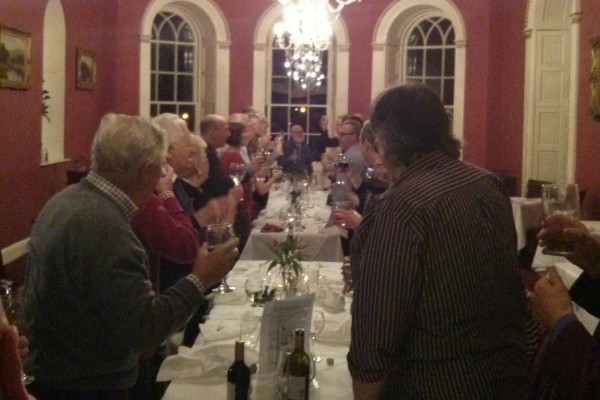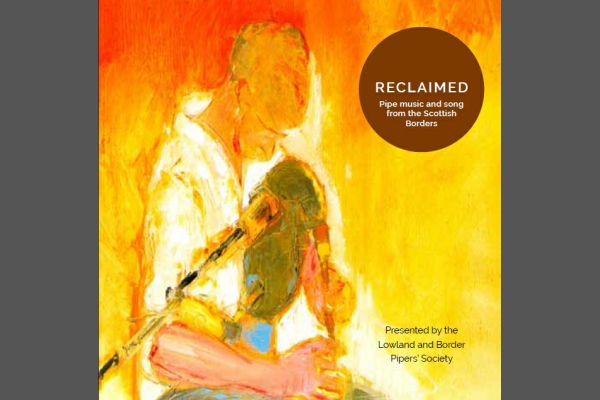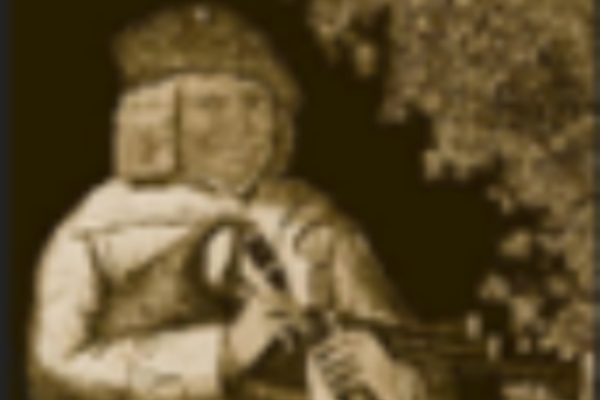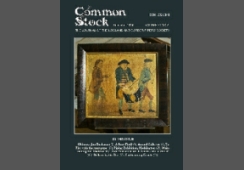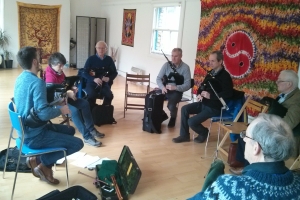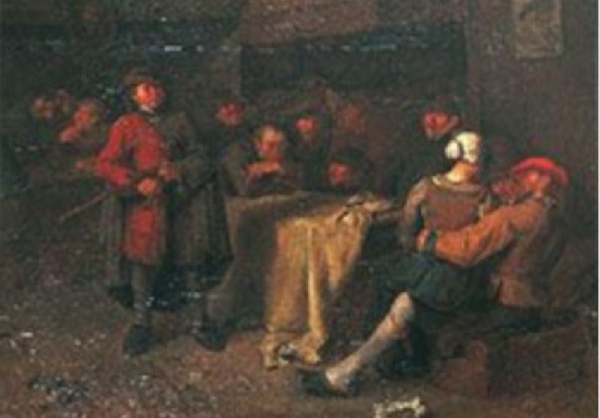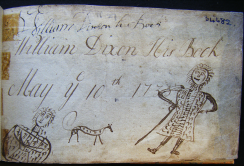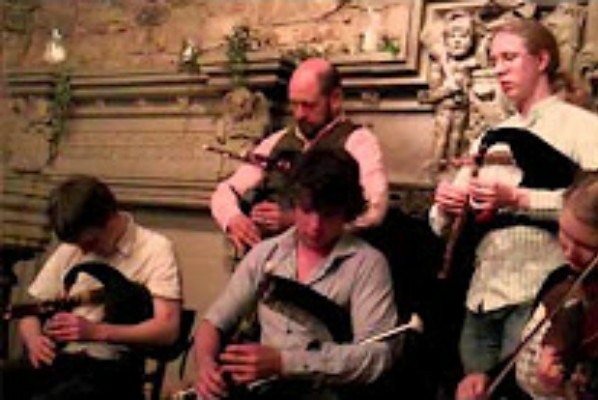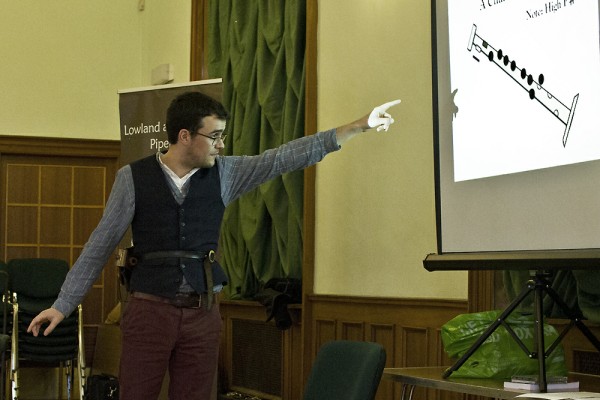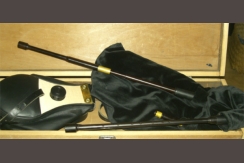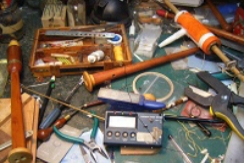Here Julian Goodacre recalls his friendship with Nigel
I first met Nigel in the late 1980s at an LBPS meeting at The School of Scottish Studies in Edinburgh. In those days he was still working in the office of Ben Line
shipping company and I was living and pipemaking in Edinburgh. Both of us were enjoying parenthood, somewhat late in our lives. It was clear when we met
that he wanted to know more about pipemaking but at that time he was rather reticent about his reasons for this.
He used to visit my workshop occasionally and eventually he admitted to me that he was designing a fully chromatic chanter using Boehm -type key work. He was a man possessed by this one idea and eventually gave up his job and took the instrument repair course at Stevenson’s College, at the same time building up a workshop in his spare room in his flat in Trinity, where he lived with Heather and their son Euan. I was impressed by the meticulous way in which he was studying the intricacies of key work, but I wasn’t convinced that pipers would take to the challenge of mastering a chanter of such complexity. However, I was happy to show him about gun drilling and other pipemaking techniques. His chromatic chanter was beautifully designed using the kind of keywork found on a clarinet or flute, including ring keys which I had never seen before. He insisted at first that he wanted only to make chanters and had no interest whatsoever in making complete sets of bagpipes. In 1990 he ordered a set of border pipes from me, (excluding the chanter), which I made to his own dimensions and from the tropical hardwood that he supplied. This was the set that he used when testing his chanters until he eventually began to make his own complete sets of pipes.
He was an accomplished guitar player, and a wonderfully sensitive accompanist in any session. In the notes to his solo CD he wrote. When I heard Bert Jansch’s first record in 1964 it changed my life. Although I’ve played music of many different types, his playing, and that of John Renbourn and Davey Graham, has always been my main inspiration. He made several stringed instruments, possibly while he was at Stevenson’s College, one of which was his own design of a hybrid cittern type instrument (I’m a bit vague about things with strings) which had sympathetic strings running at an angle across the soundboard.
I don’t know how much piping he had done before he decided to design his fully chromatic chanter, but I know he was taking lessons in bellows-piping and learning fast. I remember him coming to my workshop once and enthusing about the tune Donald Willie and His Dog that he was learning. It’s a really great tune and I’d never heard it before and now I always think of him when anyone else plays it.
Some more adventurous pipers did become interested in his chanter design, in fact Gordon Mooney played one for many years, but I know Nigel was disappointed by how reluctant most pipers were to adopt such a sophisticated chanter. We drove down together one year to the London Early Music Show where I regularly had a stall, but it wasn’t really the right place to exhibit his chanter. He also had a stall one year at the St Chartier Festival in France. I think it was there that, reversing the usual process where development goes from simple to com- plex, he began to realise the virtue of designing a keyless border chanter.
I think by this stage he was also making entire sets of bellows pipes and eventually began to work from a workshop in Albert Street, Edinburgh with his assistant Alan Waldron under the name of Garvie Bagpipes. His border pipes and smallpipes deservedly gained an excellent reputation and he even branched out into making low D whistles. He later moved to Pathhead outside Edinburgh and carried on making pipes from a purpose-built workshop in his garden. I’m happy the business continues with Alan, though now in Stirling.
In his early days of chanter making I saw him in various musical combinations. The wonderfully named Bag of Cats featured Rick Bamford on percussion and Dick Lee, often on bass clarinet. That was a jazzy combo!

He had an affinity for music from the east. He loved complex time signatures and the music of India especially intrigued him. He regularly travelled there to study music, and it was there he met and became close friends with the two Indian musicians that together with Ross Ainslie made up the four- piece India Alba. They recorded two excellent CDs, but sadly I never saw them live.
It was about five years ago that he was diagnosed with incurable liver cancer and he was determined to make the most of every minute that was granted him, which he assumed would be only a couple of years. But he managed to travel frequently to India for treatment and to follow his passion for Indian music as well as to Thailand to be with his partner, Penn. Whenever he returned to Scotland, he carried on pipemaking undeterred. I used to phone him every few months to see how he was doing. The last time we had a long conversation was on 7th October last year when he told me that they had run out of treatments for his cancer. He said, “I may be on the way out, but I’ve had a fucking fantastic life!” He had spent most of lockdown in Thailand with Penn and had returned last August to a full order book. And he kept going on pipemaking! He said, “I’m working like a stupid bastard to keep the Grim Reaper at bay” When I phoned him on December 23 he could only speak in a whisper. His last words to me were “Take care, lots of love”.
I always enjoyed Nigel’s company even though at times his lengthy answers to even the simplest of questions could be infuriating! He simply didn’t do one word yes/no answers! But he was so warm and good-natured and who can forget his unique laugh? In his last few years he discovered, much to his surprise, that he could write songs and sing them, and this led to his final project of recording the CD called ‘Not Before Time’. It features some amazing musicians including Su-a-lee, Dick Lee and Ross Ainslie, with some fine guitar playing from his son Euan. Nigel plays guitar and cittern and sings.
His songs contain much of his philosophy on the world and life. My own favourite is Mountain; a very pretty tune, though the words contrast starkly with his uncompromising beliefs on religion.
There will never be a judgement day
We all will just sometime fade away
But there ain’t no day of judgement coming
The idea is absurd
Good news for all the world.
I will always cherish the memory of a moment that occurred at one of the pipe makers exhibitions at the Edinburgh Folk Festival in the early 1990’s. It was on the Sunday morning and each maker was busy setting up their individual tables long before any of the punters arrived, when I slowly became aware of a special calm feeling pervading the entire room. Nigel was quietly noodling on his cittern in one of those interesting modes and scales that he so loved to explore. It was a memorable musical moment for me of a man who will be missed by all who knew him.

CD cover
https://www.birnamcdshop.com/product/nigel-richard/

I’ve dedicated this pipe march to Nigel. It’s full title is Nigel’s Liverpool Badger Preservation Society. He was on the committee of the Society when I was Chairman and we were all discussing the newfangled idea that the Society should have its own website. Someone suggested that we should register www.lbps.com . Nigel was concerned that this address may already have been registered, possibly by the Liverpool Badger Preservation Society!
Julian Goodacre May 18th 2021
